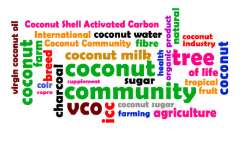Integration of in silico and in vitro approach to reveal the anticancer efficacy of Virgin Coconut Oil
Abstract
Background: Virgin coconut oil (VCO) has antioxidant properties and is being increasingly used as nutraceuticals and cosmeceuticals. It also has a long history of ethnopharmacological use. Anticancer effect of VCO has been reported in several articles. The main bottleneck of exploring the anticancer efficacy of VCO is the difficulty in identification and validation of target proteins and their regulated pathways.
Aim: The work plan was in-silico analysis using Comparative Toxicogenomics Database (CTD) and STRING. CTD curated and integrated data for more than 5700 gene-disease and 2000 chemical-disease relationship. Medium Chain Fatty Acids (MCFAs) from VCO like Lauric acid, Caprylic Acid, Capric Acid, and Myristic acid can target almost 17 cancer-associated proteins.
Method: Using in silico and in vitro approach, an attempt was made to identify the target proteins and their pathways regulated by VCO.
Result: We analyze curated and inferred VCO-gene expression data and illustrate the impact of VCO exposure on cancer-related gene network and molecular function. In enriched pathway analysis, it has been evident that all of them are the part of different cancer-associated pathways (Neoplasms, Digestive System Neoplasms, Urogenital Neoplasms, Liver Neoplasms). This response may mimic the biological response to VCO. In silico result was tested by in vitro study and VCO kill the Human hepatocellular carcinoma cell lines (hepG2).
Conclusion: Based on the findings of this study and several published studies it is proposed that a VCO may have immense potential as a botanical product against cancer.
References
2. Cohen LA, Thompson DO, Maeura Y, Choi K, Blank ME, Rose DP. Dietary fat and mammary cancer. I. Promoting effects of different dietary fats on N-nitrosomethylurea-induced rat mammary tumorigenesis. J Natl Cancer Inst. 1986 Jul;77(1):33-42.
3. Law, K.S, Azman, N., Omar, E.A, Musa, M.Y, Yusoff, N.M, Sulaiman, S.A. and Hussain, N.H.N. (2014) The Effects of Virgin Coconut Oil (VCO) as Supplementation on Quality of Life (QOL) among Breast Cancer Patients. Lipids in Health and Disease, 13, 139.
4. Conceição LL, Dias MM, Pessoa MC, Pena GD, Mendes MC, Neves CV, Hermsdorff HH, Freitas RN, Peluzio MD. Difference in fatty acids composition of breast adipose tissue in women with breast cancer and benign breast disease. Nutr Hosp. 2016 Nov 29;33(6):1354-1360.
5. Fauser JK, Matthews GM, Cummins AG, Howarth GS. Induction of apoptosis by the medium-chain length fatty acid lauric acid in colon cancer cells due to induction of oxidative stress. Chemotherapy. 2013;59(3):214-24.
6. Calderon J, Brillantes J, Buenafe M, Cabrera N, Campos E, Canoy I, Capili C, Carasco M, Cielo P, Co M, Collantes P, Concepcion F, Concha J, de la Cruz R, de Vera A, de Vera R, Chung F, Ji meno C, Valencia C. Virgin Coconut Oil Inhibits skbr-3 breast cancer cell proliferation and synergistically enhances the growth inhibitory effects of trastuzumab (herceptin™). Eur J Med Res 14(Supplement II): I-XXII, 1-208(2009)
7. Yahaya, Badrul & Sulaiman, Siti Amrah & Yusop, Rahimi. (2015). Apoptosis in lung cancer cells induced by virgin coconut oil. Regenerative Research. 4. 1-7.
8. Enos RT, Velázquez KT, McClellan JL, Cranford TL, Nagarkatti M, Nagarkatti PS, Davis JM, Murphy EA. High-fat diets rich in saturated fat protect against azoxymethane/dextran sulfate sodium-induced colon cancer. Am J Physiol Gastrointest Liver Physiol. 2016 Jun 1;310(11):G906-19.
9. Famurewa AC, Ufebe OG, Egedigwe CA, Nwankwo OE, Obaje GS. Virgin coconut oil supplementation attenuates acute chemotherapy hepatotoxicity induced by anticancer drug methotrexate via inhibition of oxidative stress in rats. Biomed Pharmacother. 2017 Mar;87:437-442.
10. Rudin et al., An Attenuated Adenovirus, ONYX-015, as Mouthwash Therapy for Premalignant Oral Dysplasia. J Clin Oncol. 2003 December 15; 21(24): 4546–4552.
11. Mattingly CJ, Colby GT, Forrest JN, Boyer JL. The Comparative Toxicogenomics
Database (CTD). Environ Health Perspect. 2003 May;111(6):793-5.
12. Szklarczyk, Damian et al. “The STRING Database in 2017: Quality-Controlled Protein-protein Association Networks, Made Broadly Accessible.” Nucleic Acids Research 45.Database issue (2017): D362–D368. PMC. Web. 15 July 2018.
13. Li YH, Yu CY, Li XX, Zhang P, Tang J, Yang Q, Fu T, Zhang X, Cui X, Tu G,
Zhang Y, Li S, Yang F, Sun Q, Qin C, Zeng X, Chen Z, Chen YZ, Zhu F. Therapeutic
target database update 2018: enriched resource for facilitating bench-to-clinic
research of targeted therapeutics. Nucleic Acids Res. 2018 Jan 4;46(D1): D1121-D1127.
14. Kanehisa M. The KEGG database. Novartis Found Symp. 2002;247:91-101;
discussion 101-3, 119-28, 244-52.











